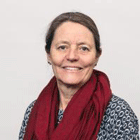More languages for more students
The University of Copenhagen’s shared university-wide vision is to improve students’ language skills across academic disciplines. The overall aim is to strengthen the graduates’ academic skills!

"Having a high level of spoken English is not the same as studying in English"
In 2013, UCPH launched its first interdisciplinary university-wide language strategy ‘More languages for more students’. The strategy had clear ambitions to prepare students for studying and working abroad and to increase internationalisation at home. Centre for Internationalisation and Parallel Language (CIP) located at the Faculty of Humanities was lead in implementing the five-year strategy in close collaboration with all six UCPH faculties.
Mapping the stakeholder needs

Associate Dean for Education Jens Erik Mogensen
"The overall ambition was and still is to boost internationalisation at UCPH through language skills. More students should have this possibility for academic enhancement." The words are uttered by Associate Dean for Education at the Faculty of Humanities Jens Erik Mogensen.
As an important first step after launching the strategy, CIP made a thorough mapping of the students’ actual needs across academic disciplines. "One very uplifting finding was a great awareness of the global workplace amongst the students", explains Professor and CIP Director Anne Holmen. We have met Associate Dean Mogensen and Professor Holmen at the Southern part of Campus on a sunny day for a talk about the language strategy and the results it has created across the university the past few years.
Initiatives for the many – and for the few

CIP Director Anne Holmen
The overall findings in the mapping showed a need for improved English, French, German – and Danish language skills amongst UCPH students - and a need for improved study skills. "Having a high level of spoken English is not the same as studying in English. Reading and speaking in any language in an academic context takes training", stresses Professor Holmen and is backed up by Jens Erik Mogensen; "Language skills and study skills are overlapping".
Another important finding was that very specialized language skills are required in some academic fields. "You will find a course in German reading skills exclusively for 2nd semester theology students whereas language requirements at other study programmes will allow for students to take language courses across faculties", explains Anne Holmen.
Lessons learned
37 projects have been set up reaching more than 4,500 UCPH students. Projects range from traditional language courses to courses combining language and other skills such as academic writing. It is not yet clear how many of the projects will terminate when the current strategy expires in 2018. "The projects that continue will help secure a language component in education programmes beyond language studies", says Jens Erik Mogensen.
However, the ‘More languages for more students’ strategy has done more than this. On an overall level, the Faculty of Humanities is now working strategically on strengthening the ties between language studies and the corporate sector. Jens Erik Mogensen concludes, "We need to create better and distinct links between language skills and employability".
Contact
Professor Anne Holmen
Director
Centre for Internationalisation and Parallel Language Use
aholmen@hum.ku.dk
A range of projects
The language strategy has secured a total of 37 pilot projects covering a range of languages - English, French, German, Spanish, Chinese, Arabic, Danish, Latin and Ancient Greek.
10 projects are traditional language courses, 27 projects are integrated as new elements in already existing courses.
CIP
The Centre for Internationalisation and Parallel Language Use website offers more information on the UCPH language strategy and other aspects of working within international education in a non-native English context.
